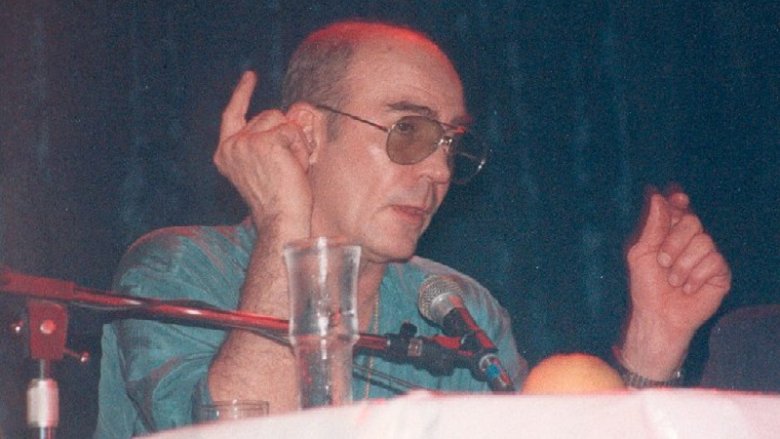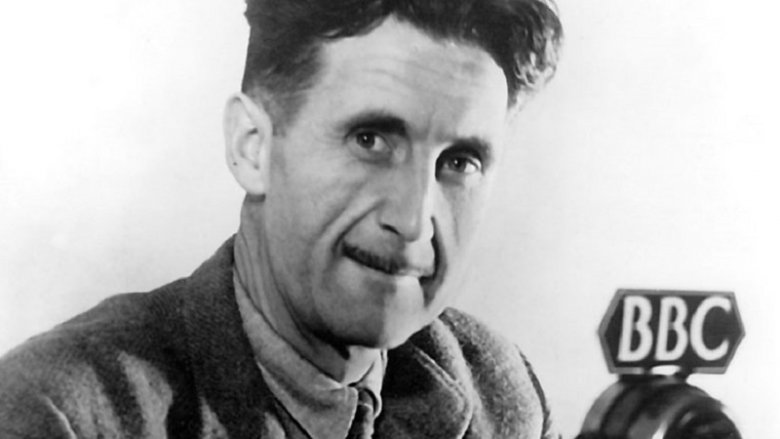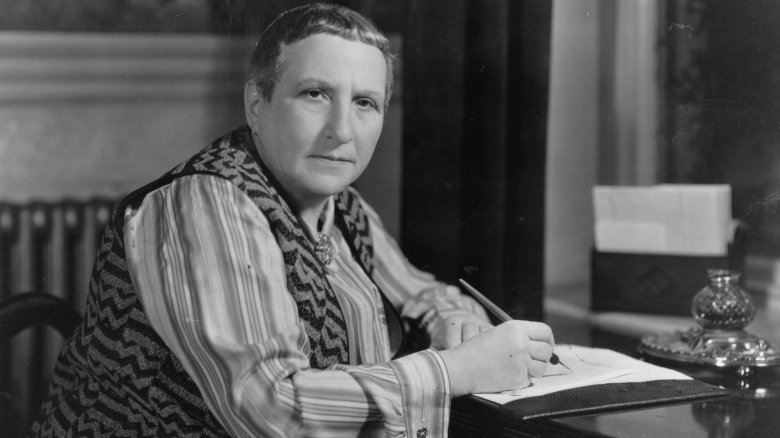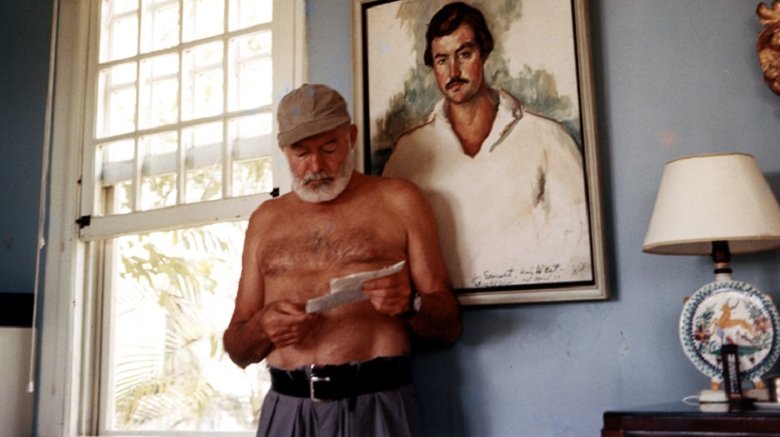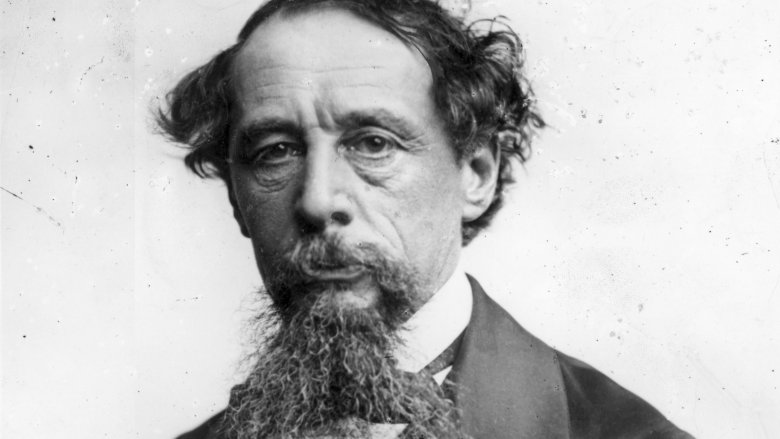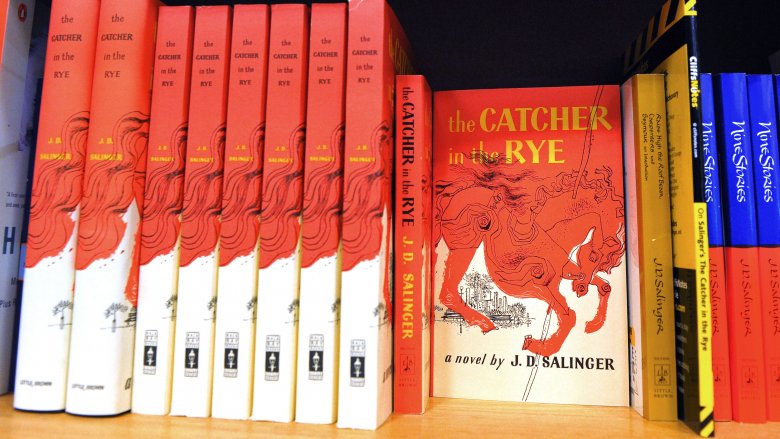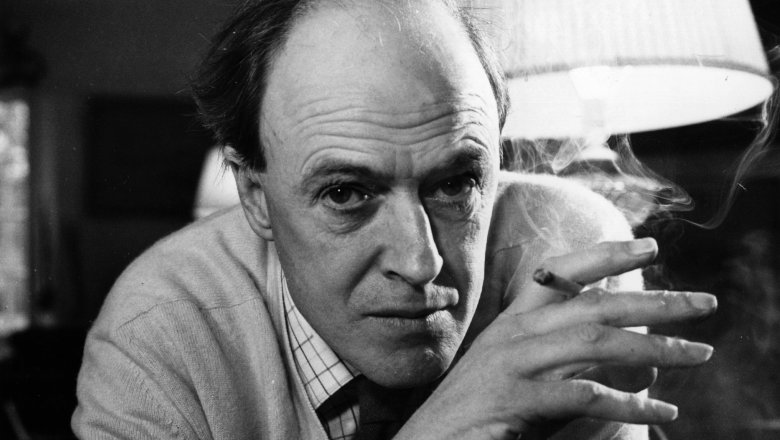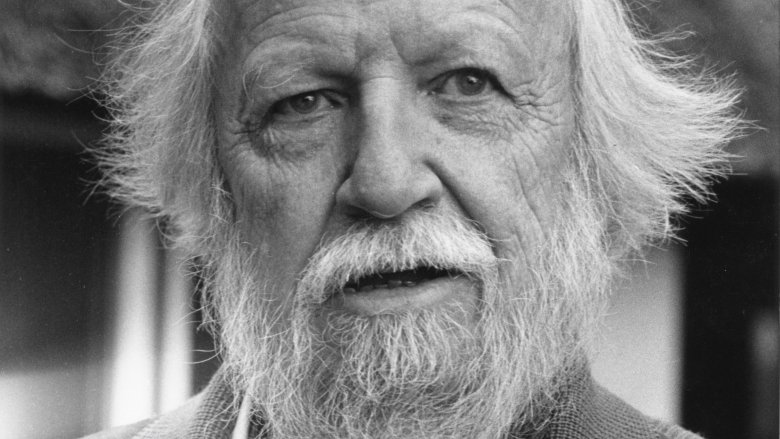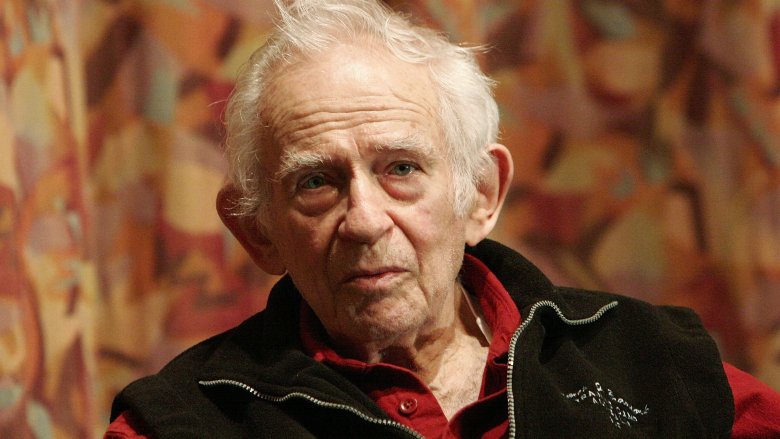Respected Writers Who Were Actually Terrible People
Writers live through their work, and if a book is good enough, an author can achieve immortality. But once a writer becomes an all-time great, people start to focus on their genius and forget about all their flaws and foibles. That's okay if the author is just your average Joe, a nice person with no skeletons lurking inside their book-filled closet, but what if he or she is actually a horrible human being? A racist? A scumbag? An attempted murderer?
Some of the best novels and short stories ever written have been penned by men and women with incredibly dark secrets. On the page, they're masters of their craft, but in real life, they've sold out colleagues, assaulted family members, and left friends trembling in fear. If you want to know which of your favorite novels were written by monsters, then brace yourself as we look at some respected writers who were actually terrible people.
Hunter S. Thompson was a first-class jerk
Hunter S. Thompson was a literary rock star, both when it came to fame and his out-of-control lifestyle. The father of gonzo journalism, Thompson hung out with the Hell's Angels, went to war with Richard Nixon, and consumed every drug known to man. But while he's a colorful character, you wouldn't want Thompson as your friend. Sure, he's a larger-than-life icon, but he was also a first-class jerk.
Need proof? Ask Bill Murray. Thompson allegedly tied him to a chair, tossed him into a pool, and nearly let him drown. Murray wasn't the only movie star to suffer Thompson's eccentricities. During the '80s, Jack Nicholson was celebrating his birthday with his family when Thompson showed up at his home in the middle of the night and shot a super powerful flare into the sky — one that lit up a 40-mile radius for nearly a whole minute. Next, Thompson aimed a military-style spotlight at Nicholson's home and fired a pistol in the air. Then he capped the whole thing off by leaving an elk's heart and some bullet casings on Nicholson's doorstep.
Thompson meant the whole thing as a joke, but Nicholson didn't think it was particularly funny. He assumed some stalker super fan was outside, about to attack, so he and his family spent the evening hiding in their basement. It wasn't the only time Thompson would get a little reckless with his firearms. On one occasion, he fired a couple of rounds at his neighbor's house. His excuse? He was being attacked by a crazed porcupine. But while we might chuckle at these wild hijinks, it stops being funny when you learn that in 1990, Thompson was accused of sexually assaulting a woman he'd invited to his log cabin. The charges were later dropped, but knowing how powerful men often get away with bad behavior, it makes it a little more difficult to love this psychotic scribe.
George Orwell sold out a whole lot of writers
Politically speaking, George Orwell was a socialist, but while he had left-leaning politics, Orwell straight-up hated the Soviet Union. The dude despised totalitarianism and couldn't stand communism. For proof, just take a glimpse at his two classic works: Animal Farm and 1984. These two novels absolutely tore the USSR a new one. But even though Orwell hated dictators and overbearing bureaucracies, that didn't stop the English author from selling out his fellow writers and artists to a powerful government agency.
In the 1940s, Orwell did some work for the United Kingdom's Foreign Office, specifically for a group called the Information Research Department (IRD). In true Orwellian fashion, that innocuous sounding name belonged to a department that specialized in churning out propaganda. The IRD's job was to smear the Soviets, so Orwell wanted to make sure they didn't hire anyone with communist sympathies. Taking aim at some high profile names, Orwell drew up a list of writers and influential people he believed sided with the Soviets. He then handed his blacklist over to the IRD.
It was a pretty dirty move, especially for a man whose entire career was about taking down Big Brother, and it seems like a lot of authors and actors wound up on Orwell's list because they were black, Jewish, or gay. While he didn't have the impact of a Joseph McCarthy, Orwell proved himself to be a first-class jerk and a horrible hypocrite who might do a fine job working for the Thought Police.
Gertrude Stein had a weird thing for fascists
One of the leading members of the "Lost Generation," Gertrude Stein was a den mother to some of the most influential artists of the 20th century. If you could travel back in time and visit her Parisian salon, you might spot Ernest Hemingway, Pablo Picasso, and F. Scott Fitzgerald. In addition to fostering one of the most creative communities in human history, Stein wrote The Autobiography of Alice B. Toklas, a book about her titular life partner. Stein was an incredibly powerful woman, but while she was one of the literary elite, she had a weird thing for fascists.
Stein once said Adolf Hitler should win the Nobel Peace Prize and even gave a Nazi salute outside the Fuhrer's bunker. Granted, there's a chance she meant this stuff ironically, but her support for Philippe Petain is a little harder to explain away. If that name doesn't ring a bell, Petain was the French chief of state during World War II, the head of the Vichy government. And while Vichy France was supposedly neutral, it was really a puppet government for the Third Reich, allowing the Nazis to run most of the country and enforcing anti-Semitic laws.
So it's a little strange that Stein was so pro-Petain, especially since she was Jewish. But she supported the man's armistice with Hitler, and she loved him so much that she wanted to write propaganda to support his reign. Stein actually translated his speeches into English, hoping somebody might publish them in the U.S. Of course, the rest of France didn't feel the same way, and after the war, Petain was tossed behind bars.
Ernest Hemingway was a KGB spy
Make the Mt. Rushmore of American writers, and you've got to add Ernest Hemingway. Papa Hemingway typed out some all-time great novels like A Farewell to Arms, For Whom the Bell Tolls, and The Old Man and the Sea, and even nabbed a Nobel Prize. But when he wasn't churning out classics, you could find him getting drunk and going on crazy adventures. He patrolled the Cuban coast in his fishing boat, hunting for Nazi subs. He survived two plane crashes while big game hunting in East Africa. He drove an ambulance during World War I and worked as a journalist during the Spanish Civil War.
However, things took a dark turn when Hemingway joined the KGB, the notorious Soviet spy agency. Part secret police, part intelligence organization, the KGB made its name jailing political opponents and murdering enemies of the state. When it comes to digging up dirt and hunting down dissidents, the KGB is right up there with the Stasi and the Gestapo. In other words, if you get a job with the KGB, you're automatically not cool. And according to books like Spies: The Rise and Fall of the KGB in America and Writer, Sailor, Soldier, Spy, Hemingway actually volunteered to do a bit of espionage for the Soviets. He was given the codename "Argo" — a ship from Greek mythology; fitting for such a nautical guy — and he met with the KGB agents in both London and Havana. But despite his willing attitude, Hemingway was a lousy spy. According to official KGB files, Argo never delivered any political information, and the Russians soon gave up on their undercover author.
Charles Dickens was the world's worst husband
If you've ever read Oliver Twist or David Copperfield, you might get the impression that Charles Dickens was an all-around awesome guy. And in some ways, the Victorian writer was an incredibly caring man. For 12 years, he ran a home for prostitutes hoping for a new beginning. His novels also helped start a conversation about life for children working in factories. But while Dickens had a soft spot for orphan kids, he wasn't so concerned about his own children. His oldest son actually once said that the boys and girls in Dickens' book "were much more real to him at times than we were." However, while Dickens wasn't a great dad, he might've been the world's worst husband.
Dickens had ten children with his wife, Catherine, and eventually, the author got tired of his bride. The life of a Victorian woman wasn't easy, and after having so many kids, Catherine was incredibly tired and overweight — so the 45-year-old Dickens started an affair with an 18-year-old actress named Ellen Ternan. Dickens had a daughter the same age as his new mistress, and he kept Ternan stashed away in various houses where he'd secretly visit her. It's likely they even had a child together who soon died.
Dickens soon decided he didn't want to be with his wife anymore, but instead of just divorcing her, he launched a major smear campaign, unfairly attacking her in the press. He published a letter in a newspaper criticizing her mothering skills, saying she didn't love her kids and that they didn't love her, which was completely untrue. Even worse, Dickens got complete custody of his kids (fathers always got the children during Victorian times), and he refused to let them see their mom on a regular basis. It's kind of shocking to know the same guy who wrote A Christmas Carol could be so cruel, which proves that just because you write awesome books, that doesn't mean you're not a real Dick-ens.
J.D. Salinger was a real creep
When it comes to writing, J.D. Salinger was no phony. The reclusive author was the man behind The Catcher in the Rye, one of the most beloved and debated novels of all time. But while Salinger's work has attracted legions of fans, many don't know — or overlook — his controversial history with teenage girls. As it turns out, Salinger was something of a creep when it came to manipulating young women. He would often lure these young girls into romantic relationships by writing them letters, using both his pen and his power to seduce and trap teenagers.
When he was 53, he spotted a teenage Joyce Maynard on the cover of The New York Times and soon drew her into a relationship. She would later write about her interactions with the writer, describing him as more than a tad predatory. Ickier still, he began courting Jean Miller when she was just 14. He kept their uncomfortable relationship going until the girl turned 20, and then they finally hooked up. After an awkward one night stand, Salinger dumped her immediately. Of course, when it came to people his own age, Salinger was far less seductive. On one occasion, a woman showed up at his house, collecting for the Red Cross, and he responded by pulling a gun and threatening to shoot her. Sure, the man was reclusive, but taking shots at the Red Cross is going a little too far with the whole angsty artist thing.
Jack London was a horrible racist
White Fang is one of the most famous 19th-century American novels, and one of the best stories ever written from a canine point of view. But there's a lot more going on here that a simple story about a wolf making its way in the world. Pick up a copy of White Fang and skip to the part where the heroic beast encounters white people for the very first time after living with a tribe of Native Americans. "As compared with the Indians he had known," the book reads, "they were to him another race of superior gods." The novel then goes on to say that White Fang's Native American master "was a child-god among these white skinned ones." Yeah, it seems White Fang is a really racist wolf... probably because London is one of the biggest bigots in American literature.
If you think the "superior gods" stuff is bad, then check out London's essay called "The Salt of the Earth," which argued that whites are "a race of mastery and achievement." London even wrote that genocide was just a part of natural selection, something that's perfectly acceptable when "lesser breeds" encounter Anglo-Saxons. London kept up with the genocide stuff in a short story called "The Unparalleled Invasion," where the Chinese start taking over the world (a horrifying proposition in London's mind). So how does the story end? With the U.S. and Europe attacking China with biological weapons, wiping out all the Chinese, and claiming the country for white people everywhere. Yeah, not exactly what you'd call an uplifting story.
Roald Dahl was an anti-Semitic jerk
It probably won't come as a surprise that Roald Dahl — author of James and the Giant Peach, Matilda, and The BFG — was a bit of a monster in real life, not unlike the ghoulish characters that populate his stories. Dahl was reportedly a horrible person who made life miserable for everyone who worked at his publishing company, Alfred A. Knopf. According to one account, whenever Dahl dropped by the office, "secretaries were treated like servants," and, "tantrums were thrown both in person and in letters." When the company finally told Dahl to get a grip or get out, everyone in the office supposedly got on their desks and cheered.
Dahl was so bad that his first wife nicknamed him "Roald the Rotten." In addition to being generally ill-tempered, he was racist and anti-Semitic. In the original versions of Charlie and the Chocolate Factory, the Oompa Loompas weren't eerie-looking orange dwarves from a mystical island; instead, they were actually black pygmies. (To his credit, it's said that Charlie Bucket was originally supposed to be black, until an editor changed Dahl's mind.) As pointed out by the BBC, in James and the Giant Peach, the character of the Grasshopper proclaims, "I'd rather be fried alive and eaten by a Mexican." But worst of all, Dahl went on the record in 1983 as saying, "There is a trait the in the Jewish character that does provoke animosity....even a stinker like Hitler didn't just pick on them for no reason." That's right. According to Roald Dahl, the Jewish people deserved what they got during the Holocaust, which is definitely not a story you want your kids to hear.
William Golding tried to rape a 15-year-old girl
Lord of the Flies is one of the scariest books ever written. The plot revolves a group of boys who wind up on a desert island, divide into murderous factions, and revert to Stone Age savagery. It's one of the essential novels when it comes to exploring man's dark side...something author William Golding knew only too well. In 2009, it was revealed that he had recorded a deeply disturbing incident in his private papers. According to Golding himself, when he was an 18-year-old college student, he'd tried to rape a 15-year-old girl named Dora.
The assault happened a couple of years after the two first met, when Golding was coming home from his freshman year at Oxford. Golding justified his desire for a minor by writing that at age 14, Dora was "already sexy as an ape." And at 15, as they went walking one day, he decided the young teen definitely wanted his aggressive advances. But as it turns out, she wasn't interested in having sex — and she fought back. As Golding put it, he "unhandily tried to rape her," and the entire time, they were "wrestling like enemies."
Eventually, Dora put up a good enough fight that Golding was forced to back off, while trying to assure her, "I'm not going to hurt you." Of course, the fact that he'd just tried to rape her probably convinced Dora he was lying, so she took off running, leaving him behind. It's a pretty horrific story, and proof that no matter where you go, there's a lot of evil lurking in the hearts of "civilized" people.
Norman Mailer nearly murdered his wife
Norman Mailer excelled at fiction (The Naked and the Dead) and nonfiction (The Executioner's Song) alike, but he failed at being a decent human being. For all his talent with a typewriter, Mailer was a genuinely horrible person. If you need proof, then just ask his daughter Elizabeth, who told The New York Times that her mother, artist Adele Mailer, referred to him after his death as "a monster." Why would she say something so terrible about the father of her children? Maybe because Mailer almost stabbed her to death.
As it turns out, Mailer was super sensitive when it came to his writing, and when Adele claimed he wasn't as good a writer as Dostoyevsky, he grabbed a penknife and went on the attack, stabbing her in the stomach and back. The wound went so deep that he punctured her pericardial sac.
But this wasn't the only crime involving the ultra-aggressive author. In 1981, Mailer helped a convicted killer name Jack Henry Abbott get out of prison. Mailer was incredibly impressed with Abbott's writing abilities, but didn't seem to care why Abbott was behind bars. Unfortunately, just a few weeks after getting his freedom, Abbott murdered a waiter during a petty argument. Obviously, Mailer wasn't directly responsible for the death, but when he advocated for Abbott's release, he wasn't thinking about the damage he might unleash. And who was going to challenge Mailer and tell him this was a bad idea? Nobody. Because if you were on his bad side, he might shank you in the gut.
